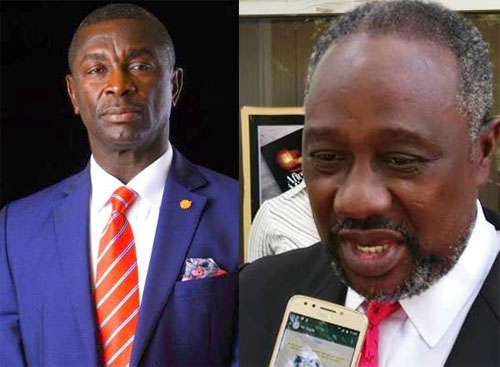Prince Kofi Amoabeng and Quincy Sintim-Aboagye
Former Chief Executive Officer (CEO) of defunct UT Bank Ghana Limited, Prince Kofi Amoabeng has been accused of defrauding the Government of Ghana and Lushann International Energy, Ghana Limited to the tune of $102,418,204 million.
Kofi Amoabeng’s UT Bank, which was a financial empire for a long-time in Ghana’s banking history, collapsed in August 2017 after Bank of Ghana (BoG) declared it insolvent and appointed GCB to take over its assets.
Officials of UT Bank had reportedly claimed that Lushann International Energy Ghana Limited’s alleged GH¢84 million indebtedness to the Bank was part of the reason for its financial stress which finally caused its collapse.
But CEO of Lushann International Energy Ghana Limited, Quincy Sintim-Aboagye, who claims to be a US Citizen, addressing the media on Monday, August 27, “to correct the false impression”, dismissed the allegations by the Bank against him and his outfit, saying “it is rather Amoabeng, former CEO of the defunct UT Bank, and two former employees of Lushann – the Accountant and Oham who were responsible for the mess and not Sintim-Aboagye.”
‘Collusion’
According to him, “The claim that Lushann was indebted to UT Bank to the tune of GH¢ 84 million is not true. It was the other way round.”
Mr. Sintim-Aboagye disclosed that “it was UT Bank, which colluded with two former employees of Lushann to rip-off Lushann and Ghana Government.”
Narrating what transpired between the two entities (UT, Lushann), he alleged that “Kofi Amoabeng, Chief Executive Officer, of UT Bank, defrauded Lushann and Ghana Government to the tune of $102,418,204, when he colluded with Kennedy Oham, former Project Manager of Saltpong Offshore Producing Company (SOPCL).”
He reported that “Again, UT Bank colluded in the theft of two shipments of crude oil worth $8 million belonging to the Government of Ghana in 2014 and 2015.”
Mr. Sintim-Aboagye alleged that “Amoabeng falsely misrepresented Oham’s company – Eklipza Energy – as a local subsidiary of Lushann and issued bank guarantees to enable the company defraud Ghana.”
Oham, said the CEO of Lushann, “forged the signature of Sintim-Aboagye and falsely signed letters claiming to be a Director of Lushann, which enabled UT Bank to issue letters of guarantee.”
Money Laundering
Continuing, he added that, Amoabeng through an arrangement with Auxesia Energy Limited, engaged in money laundering involving $61 million using the name of Lushann.
Cover-Up
When the clandestine activities were discovered, he said, Lushann reported it to the National Security apparatus namely the Economic and Organized Crime Office (EOCO), Bureau of National Investigations (BNI), Criminal Investigations Department (CID) of the Ghana Police Service in June 2014 and July 2014, respectively.
“The sad aspect of it all is that the national security apparatus did not act for unknown reasons,” according to Mr. Sintim-Aboagye.
He said after the matter was reported to national security, his private residence and the office of Lushann were attacked by unknown persons apparently to destroy evidence the company and himself had in their possession against Mr. Amoabeng and his ‘criminal’ gang.
Mr. Sintim-Aboagye said in line with the US Overseas Fraud Act, he later reported the matter to the US Embassy in Accra.
Efforts to reach Mr. Amoabeng to get his side of the story proved futile.
BY Melvin Tarlue


